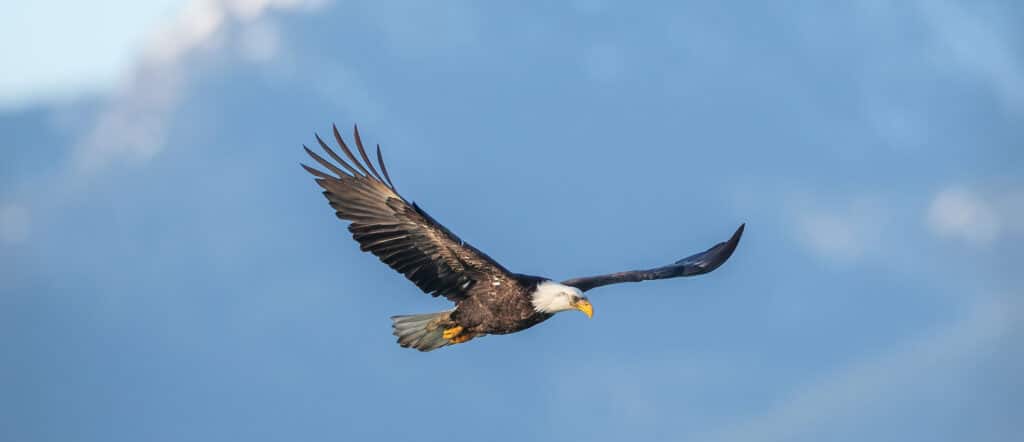June 21, 2023: National Indigenous peoples' day
“All of our stories talk about respect and laws come out of those stories so that they can understand their stewardship responsibilities.” – Douglas Neasloss
IT'S MORE THAN A STORY

Darryl Whetung, Post Production Manager, Pacific Wild
When I was a young boy my father had sat me by a willow and told me a story of a being we call Nanabozho. Nanabozho is our trickster in Anishinaabe culture.
Nanabozhoo wanted to see farther and gain more knowledge than any other being in our natural world, and so he looked to the top of the red willow for this vision. What he saw was a proud and wise eagle at the top.
Jealousy came over Nanabozho as watched an eagle gaining this knowledge. He noticed that with eagle eyes and the willows height, an eagle could look farther than any being into the four directions (North, East, South and West) of our natural world.
Nanabozho knew that if you could see far within these directions, you could see forward into the future of the next coming four seasons.
With the suffering the last four seasons brought to Nanabozhoo, from war and hunger, he wanted to be prepared for anything that could happen to him in the coming year.
Nanabozhoo asked the eagle if he could come up?
Eagle, cautious and very aware of Nanabozhos tricky nature told him, “If you throw your eye balls to the top of the tree you can see the season in every direction, but they can only hang from the tree four times a day, nothing more”.
Nanabozho quickly pulled out his eyes and threw them into the tree, but they got hung up on a low hanging branch at the bottom of the red willow. As his eyes fell back into his hands, he furiously threw them three more times, almost making it to the top of the tree.
Eagle warned him “you can not throw them any more times today”. Arrogantly Nananbozho threw them up a fifth time and just as they almost landed at the very top of the red willow, Eagle caught Nanabozho’s eyes and flew away.
Exhausted and now blind, Nanabozho felt defeated. The area his eyes once were now held great pain.
To find relief, Nanabozho leaned his back against the tree and rolled two balls from the sap at the bottom and placed them into the sockets his eyes once were. As he closed his eyes his pain slipped away and with two blinks, he could see once again.
This story holds great moral and metaphor. Some could say it means, “don’t get greedy” or “jealousy leads to greater pain”.
But this story taught our people how to harvest medicine from the red willow and – was passed down to teach the young the way to harvest aspirin from the willow seasonally. The greatest concentration of aspirin will come from the bark transferred to the sap, in summer at the top, down to the fall, spring and winter at the bottom of the tree.
Our stories are laws, our stories are science, they are mathematics, governance and our way in the world to live in a good way.
To live in a good way is the law of my people. To live this way is to live with respect and to show respect to all beings and spirits you share space with.
We associate the spirit with all that is natural in the world, and this was our way before the new world had given us no choice but to follow the road to progress.
Along progress road we lost many things that were natural in this world, so we lost many spirits that were a part of our own.
It’s most important for our new residents to know that together, with respect and acknowledgement to whoever lands and waters you reside, we can make progress together and live in a good way.
If we show our humility, honesty, respect, courage, wisdom, and truth there will be love. That is the seven teachings of the medicine wheel of my people. And with that we can protect a natural world for our children’s future and the generations to follow.
This is our law.
When I fall out of balance I am reminded by an old saying.
“When you are born in this world you cry and people rejoice. Live your life so that when you leave this world people cry and you rejoice.”
I wish us all a chance to live this way.
Miigwetch and Happy National Indigenous Peoples Day to all my relations.
Video Transcript:
Right now on the B.C. coast, I would say there’s very little protected areas and I think we need to see more of them.
It’s not just a story.
Things like the wildlife act was developed in the late 1800s by hunters,
for hunters with very little conservation mandate and zero First Nations input.
And it’s not something that will tolerate.
And right now, the way it’s been over the last number of years is that everything is open to everybody.
That’s not management.
And all of our stories talk about respect, and laws come out of those stories so that they can understand their stewardship responsibilities.
And so that’s something that we want to make sure that’s not just our community in these towns, but all people.
And I think everyone will serve to benefit from that.

